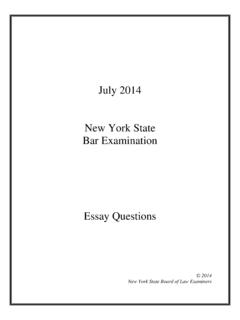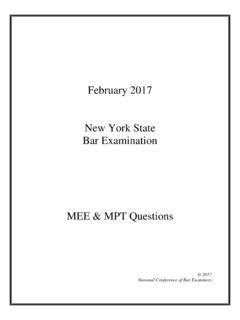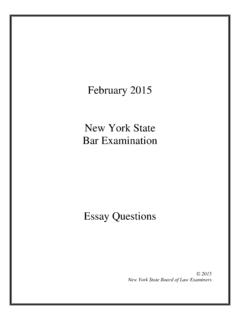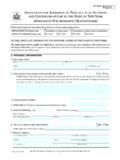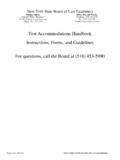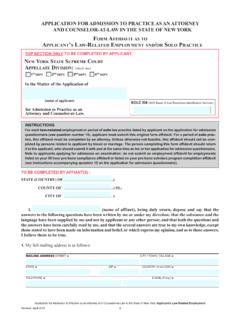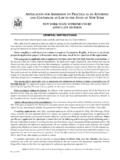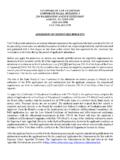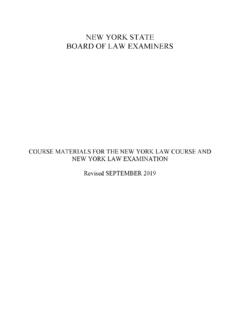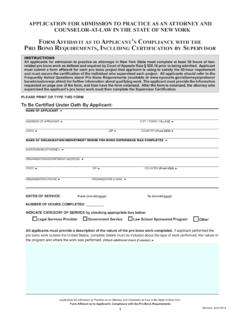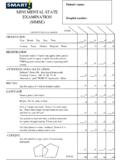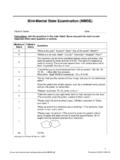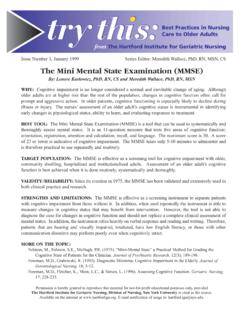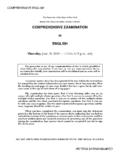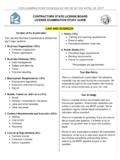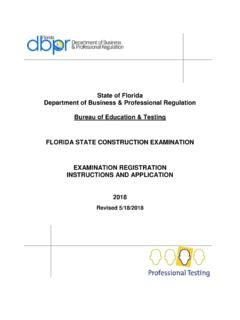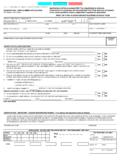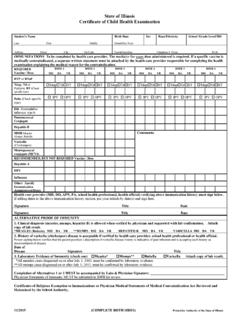Transcription of February 2016 New York State Bar Examination
1 February 2016 New york State Bar Examination Essay Questions 2016 New york State Board of Law Examiners 1 QUESTION 1 In 2000, Wife purchased Blackacre, a commercial building. In 2002, Wife married Husband, and thereafter Husband managed Blackacre by collecting rents, negotiating leases and making repairs and improvements that increased the value of Blackacre. Wife continued to own Blackacre in her own name. At the time of the marriage, Husband was employed as a firefighter in C City, where the couple lived. Husband worked an overnight shift, which allowed him the flexibility to manage Blackacre.
2 In July 2010, Husband negotiated a lease for one of the commercial units in Blackacre with Tenant, the operator of a retail store, for a five-year term ending in June 2015. In addition to the rent, the lease required Tenant to be responsible for all repairs to the store. After the lease expired in June 2015, Tenant remained in possession, paying the rent each month. In December 2015, a water pipe burst in the store, causing extensive damage. Tenant remained in possession but refused to pay any further rent or to repair the damage to the store, claiming that, because the lease had expired, he was no longer required to make repairs.
3 Shortly after their marriage, Husband and Wife had purchased a lot in a subdivision of 50 lots owned by Owner. The deed for every lot Owner sold in the subdivision, including Husband s and Wife s lot, contained a restrictive covenant stating that only a single-family house could be built on each lot, and that the covenant would be binding on all successors in interest. The deeds for all of the lots were recorded with the county clerk. In 2008, Husband and Wife built a single-family house on their lot and moved in. In 2013, Husband and Wife sold the house to Wife s sister, Val. The deed from Husband and Wife to Val did not contain the restrictive covenant.
4 Val decided to convert the house into a two-family residence and rent the second apartment. Val was about to begin the conversion when she received a letter from Owner, who still owns some lots in the subdivision. Owner threatened legal action to prevent Val from converting the house into a two-family residence in violation of the restrictive covenant contained in the deed from Owner to Husband and Wife. Val contends that the restrictive covenant is invalid as an unreasonable restriction on her use of her property and, in any event, is not applicable to her, as it does not appear in her deed. 2 As an employee of C City, Husband has participated in C City s pension plan since before his marriage to Wife.
5 For each month and year of service, he receives incremental credits which enter into the computation of what his pension will be when he reaches age 60. Husband is vested in the plan, and if he leaves C City employment before reaching age 60, he will nevertheless receive a pension at age 60. Husband continues to manage Blackacre, which has substantially increased in value. Wife is considering seeking a divorce from Husband. 1. If Wife seeks a divorce, under equitable distribution: (a) To what extent, if any, will Husband have the right to share in the value of Blackacre? (b) To what extent, if any, will Wife have the right to share in the value of Husband s pension plan?
6 2. What liability, if any, does Tenant have for rent and the repairs? 3. Is the restrictive covenant valid and enforceable against Val? QUESTION 2 Oscar, the owner of a convenience store, was having financial difficulties. He approached Al, whom Oscar knew to have a criminal record, and asked Al to burn down the store so that Oscar could recover an insurance settlement. Al agreed to do so for $5,000. Al told his friend, Fred, who was on parole from an arson conviction, that Oscar had asked him to burn down Oscar s store. Al asked Fred if he would help by making an incendiary device for him to use to burn down the store.
7 Fred agreed to do so for $1,000. Fred thereafter made the incendiary device and delivered it to Al. The next day, Fred had second thoughts about what he had done because he truly wanted to reform his life. He called the police to report the planned crime. He also called Al and told him he should abandon his plans because the police knew of the intended arson. Based on Fred s call, the police opened an investigation. Ignoring Fred s warning, the next night Al drove to the store when it and all nearby businesses were closed. He set off the incendiary device, causing the store to burn to the ground. 3 Oscar, Al, and Fred were all arrested and charged with the crimes of arson and conspiracy to commit arson.
8 Fred was also charged with the crime of criminal facilitation. Fred agreed to testify against Oscar and Al. At the trial of Oscar and Al, the district attorney presented: evidence to show the store had burned down as the result of arson; Fred s testimony regarding his conversations and transactions with Al; and an eyewitness who testified that he saw Al s vehicle outside the store a few minutes before the fire. All evidence presented by the district attorney was legally admissible. 1. Without regard to what evidence was presented at trial, based on the above facts: (a) Did Oscar commit the crimes of (i) arson and (ii) conspiracy to commit arson?
9 (b) Did Fred commit the crimes of (i) arson, (ii) conspiracy to commit arson, and (iii) criminal facilitation? (c) Assuming Fred committed the crimes of arson, conspiracy and criminal facilitation, may he successfully assert the defense of renunciation to each of those crimes? 2. Was the evidence presented at trial sufficient to convict Oscar and Al of the crime of arson? QUESTION 3 Ash Corp., a New york business corporation, owns and operates a gypsum mine. Gypsum is the basic raw material used in the production of wallboard. Wall, Inc., also a New york business corporation, manufactures wallboard and sells it to building supply houses. Brock is a 50% shareholder of Wall, Inc.
10 But does not serve as a director of that corporation. Brock is a director of Ash Corp., but owns none of its shares. In June 2014, Ash Corp. and Wall, Inc. entered into a contract by which Ash Corp. agreed to provide Wall, Inc. with gypsum at the price of $40 per ton, the then fair market price, for a one-year period, commencing that month. The contract did not specify a quantity of gypsum to be provided, but stated that Ash Corp. would provide all the gypsum Wall, Inc. required during the contract period. The parties had not previously done business together, but the contract stated that Wall, Inc. s typical and anticipated future requirement for gypsum was 10,000 tons per year.
